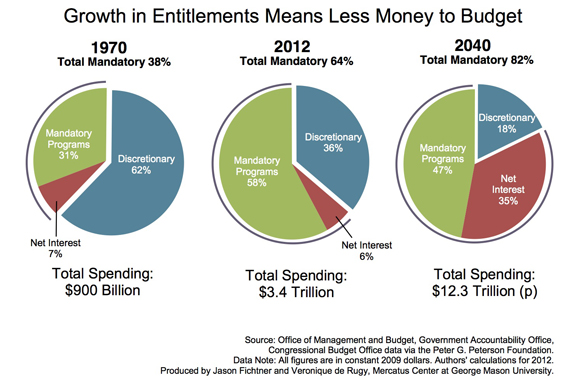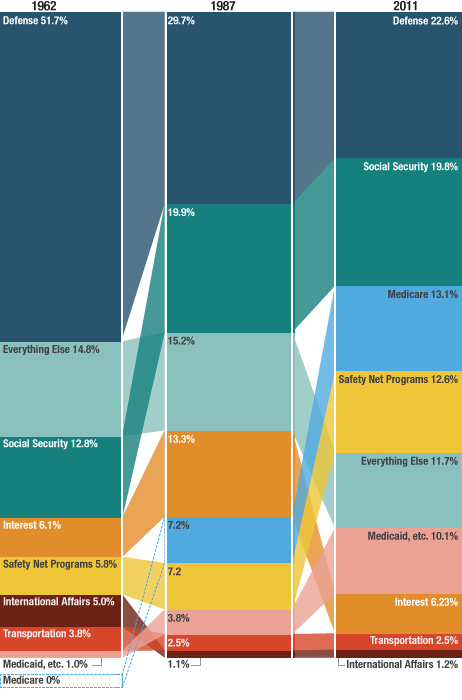What are Entitlements?
The fastest growing area of government since the late 1940s has been entitlements, which take up three-quarters of our budget and make debt slavery normal.
You will note that the mainstream media is careful to avoid defining entitlements, which are money given by government to citizens as a matter of civil right or “entitlement”:
Entitlement, generally, any government-provided or government-managed benefit or service to which some or all individuals are entitled by law.
Some examples:
Among government-provided or government-managed entitlements in the United States, some have been means-tested (Medicaid, Aid to Families with Dependent Children [AFDC], and the Supplemental Nutrition Assistance Program (SNAP), formerly known as food stamps), while others have been available to most or all people independent of means (social security and Medicare). Legally mandated employer-provided benefits have included workers’ compensation and unpaid leave for family and medical reasons.
If you want a simpler definition, look toward the political definition of entitlements as commonly understood:
3: a government program providing benefits to members of a specified group
also : funds supporting or distributed by such a program
In other words, wealth transfer: take from the contributors (creators, producers, maintainers) and give to the non-contributors (lower-level workers, unemployed, unemployable).
These have secondary consequences: the more money you give out that is not in exchange for some work or product, the more your economy dies of a slow malaise because free money reduces the value of money by making it easier to acquire, therefore less valuable.
Think of it this way: if you give everyone ten dollars every day, ten dollars becomes the new zero. You assume everyone has it and it is the minimum point for entry into economic transactions. Something that used to cost ten dollars now costs twenty dollars.
On the other hand, if you pay someone ten dollars for doing a task, this displaces their potential income from other sources, so not everyone has that ten dollars and it still has value. Inequality is necessary for currency to have value.
When the Utopians speak, they talk of a time when the money is distributed equally. At that point, no one does anything because there is no reward in it, perhaps, but certainly because they are seeing others doing nothing and getting the same amount.
Even more, people in such a system realize that they will never be recognized except through weird awards and ceremonies that have nothing to do with real life. It is like being in school forever with no hope of escape.
What the Utopians call “capitalism” is merely economics; their only alternatives involve government taking money at gunpoint and redistributing it through bureaucracies, perpetuating those bureaucracies and making government more important than quality people.
Entitlements spending has grown since the 1950s to become the largest area of government spending:
Consider how rapidly entitlements have taken over the budget and increased its size massively:
You can see the consequences of entitlements spending through the stagnation of the economy:
After adjusting for inflation, however, today’s average hourly wage has just about the same purchasing power it did in 1978, following a long slide in the 1980s and early 1990s and bumpy, inconsistent growth since then. In fact, in real terms average hourly earnings peaked more than 45 years ago: The $4.03-an-hour rate recorded in January 1973 had the same purchasing power that $23.68 would today.
Even our own government acknowledges that we are in a runaway entitlements spending loop:
Almost all of the projected growth in federal spending other than interest payments on the debt comes from growth in spending on the three largest entitlement programs — Medicare, Medicaid, and Social Security. By CBO’s estimates, the increase in spending for Medicare and Medicaid as a share of GDP will account for 80 percent of spending increases for the three entitlement programs between now and 2035 and 90 percent of spending growth between now and 2080.
Those bureaucracies inevitably create the Keynesian stimulus circular Ponzi scheme, which “pump primes” the economy by handing out free money, but each time it does, it makes the economy sicker and reduces its value.
The Utopians fear quality people because that establishes “hierarchy,” or a Darwinistic system where people are rewarded in proportion to their contribution (creation, production, maintenance). This means that the spiteful mutants with high genetic drift load are cut out of the pie.
However, through their fear, Utopians create societies which are hostile to nature, reality, and quality. This creates a dying system, so for the neurosis of the fearful, society is thrown into the abyss and everyone suffers… equally.
Tags: capitalism, economics, egalitarianism, entitlements, socialism, stimulus












